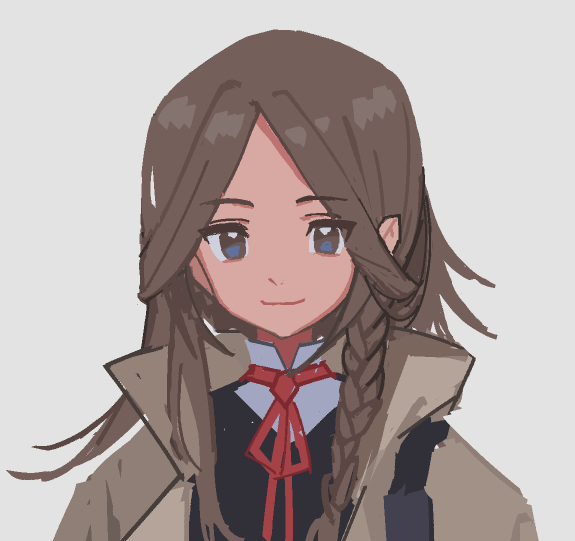

I told you to get extra saves for a reason, the game will fuck you over for a choice you made 30 hours ago with no warning if you don’t.
Rad that you did a wizard Denam though
🎀 Fashion Weirdo Elegant Sweet 🎀


I told you to get extra saves for a reason, the game will fuck you over for a choice you made 30 hours ago with no warning if you don’t.
Rad that you did a wizard Denam though


There are several. All of them are Ramza 1v1s though, but very difficult ones. Also all of them can be almost softlocks if you picked the wrong zodiac. Which I did. They’re still possible but way harder. It is easily the worst part of the game and it means mage Ramza is an even worse idea than mage Denam is.


They’re not unusably bad, it’s just Cid exists and breaks the game in half.
Most of the best named characters are locked behind late game sidequests that I didn’t do. The others are usually better but not by so much that generics become useless. And you can’t even run a full party of nameds until after the hardest boss fight in the game anyways, a fight which is hard for reasons entirely unrelated to your party since it’s a Ramza solo.


They exist because the game still has a permadeath system and the devs didn’t want you softlocking. Plus they represent the way they wanted you to get invested, to take these randoms and turn them into your big special characters, like how FF1, 3, and 5 were. And I mean it works when you do put in the effort to, Joyse was a joy (heh) to level and build into my cute adorable red-but-red-doesn’t-actually-exist-so-she’s-really-black mage. Named characters are just the path of least resistance since they’re already very good when they join and don’t need investment whereas generics do. Kinda like prepromotes in FE.


Glad I could help lol.
I do think the five-man partes are fine but there’s a real adjustment period while you get used to it and I still would have preferred like, 8. Part of it is also that early game you really need to turtle but once you start getting the named characters (who are all stronger than any generic could hope to be and you should just use them once you can instead of bothering with leveling generics) they allow you to do a lot more since they have better damage output or survivability. In my run with the exception of one generic black mage (Joyse my beloved) all of my units by endgame were named and the only one I had ever grinded in any way was Ramza to get him into Samurai. (And also monk for that one stupid god damn boss fight)


Yeah gonna second what everyone else is saying in that you need to grind. The way that the class system works basically necessitates it since you need to get individual characters levels in one class to unlock a new one which effectively resets their progress so you have to restart. I usually try to avoid grinding in SRPGs (because Fire Emblem elitism brain) but I realised at like mission 5 that I was going to have to. Once you get a bit ahead levels-wise you can skip grinding for a while until you add a new class onto a character. Also keep several save files, there’s one or two multipart missions that will fuck you up if you aren’t ready for it and you can’t go back if you don’t have a save before it.
The small party size is a full game thing, it’s not 4 units but rather 5 for the majority of the game though. The idea was that FFT wants you to get really invested in a small number of units that you build up in the same way that you would in a normal FF game. (Although the game also wants you to have access to the majority of classes on your party so you can swap when necessary, which means more grinding. I just didn’t do this barring a few particular builds in my party which made some maps harder than they should have been, but I think it was ultimately doable.)


Wouldn’t be the first time an ML would be called an anarchist considering State and Revolution was derided as too anarchist by other bolsheviks when it was made


Machete order is evidence that extreme plot twists-brain is counterproductive to actually enjoying art.
It’s not just a show thing unfortunately, it’s faithfully replicating the manga here.
Yeah, I had read the manga about two and a half years ago and while I initially really enjoyed it for the cozy travel and the bittersweet start, I gradually lost interest when it became clear that the story was starting to focus more on its mediocre conflicts rather than the travel.
I specifically dropped it a bit after the maze arc, when they were introducing the new demon villain who had been mind-enslaved to serve a kingdom but still found a way to kill that kingdom.
I was following it as it came out at the time so that probably didn’t help either, since waiting a week for a chapter that was about a conflict I didn’t care for and clearly wouldn’t be resolved for another few weeks made me lose interest. Especially when I was also reading my current favourite manga for the first time around then. And that manga, Witch Hat Atelier, manages to balance amazing vibes while also having compelling “conflict” writing that I enjoyed a lot more.
I’m very glad that the anime has been doing so well though, while I dropped it I still vastly prefer it to the isekai fantasy that was so common for the past decade.


A lot of people here have already suggested Ogre Battle and Ogre Battle 64, but I’d also recommend Tactics Ogre. It’s in the same series but is an SRPG instead of the… Whatever you’d describe Ogre Battle as. The story is quite good and the game has 3 pretty fleshed out routes. There’s also 3 versions of it, the newer two (PSP and current consoles) have a better translation but from memory the original is passable. I’m sure there’s a patch if you find it bad, though I would have to check.
Beyond that, Xenogears was already mentioned and is great. I’m quite partial to the Mana games and Terranigma. Moon is also really interesting, being a sort of parody RPG that heavily influenced Toby Fox when making Undertale.


Is this just a massive self report?
Yes



The idea is that it’s meant to be moving in all directions unrestricted. The Order symbol is just a single arrow to add to this idea.
But yeah it is quite a clean design, especially compared to other anarchist symbols like the common depictions of the A, but you can make less clean versions of it quite easily.


His books are pretty decent. They’re pulp fantasy but in a more interesting way compared to other pulp fantasy. Chaos is still often depicted as a villainous force in them but it’s less cut and dry compared to his derivatives. Particularly since Order is also included as the opposite and isn’t presented as being (that much) better.
There’s also a lot of them, I’d recommend reading a synopsis of each main story he wrote then picking the one that interests you the most to start with. They’re all mostly self contained but he also popularised the use of multiverses in fiction to do some crossovers between the different series.


Yes, but that’s because GW took the symbol from Michael Moorcock’s writings where it is also the symbol for Chaos as a cosmological force but in a less inherently evil way.
The symbol has some history as an anarchist symbol predating GW’s use of it in Warhammer. This is partly because Moorcock is an anarchist so lots of anarchists at the time read his fiction, but also simply because it’s a cool looking symbol that represents chaos and thus fits the vibe.


Plenty of millenials mill (in mtg)
Hard agree, I find it extremely dull whenever fantasy races (or non-human player characters in general, as it often happens) are just normal people with some weird physical feature that beyond its mechanical effects almost never comes up in game past the surface level.
Ultimately even in the case where they are just humans plus some feature that feature should heavily change how they relate to the world in some way, and not just in the regular dwarf/elf/hobbit stereotypes way. An elf should have an extremely different relationship to the passage of time and the seasons. That, in turn, should give them different feelings on life and death, relationships, morals, teaching, art, etc… But so often they’re reduced to a caricature that might pay lip service to one or two of these changes but is otherwise just a normal arrogant person.
I can understand the appeal in having normal people with fantasy features of course. They’re easier to roleplay and relate to. This makes them good for lighthearted campaigns which often need both to be fun. But I feel like in serious stories you’d be better off just dropping the fantasy races entirely if you aren’t doing much with them. Human-centric fantasy can be really fun in its own right.
I admittedly also don’t like having outright evil races, but I think there’s better solutions that don’t require making them normal people. Culture is an obvious one, and seemingly the one that D&D has mostly adopted now for Drow and the like. Giving them weird moral systems based on things that they would view as the highest good but we wouldn’t is another good option.


I loved the first and was really excited for this one but unfortunately my PC can’t run it. It’s definitely one of the first games I’ll play when I eventually replace it.


Not an anime but rather a manga: My Broken Mariko is a very angry short manga about the impact suicide and abuse have in someone’s relationships. I ugly cried a lot after reading it.
Actually just looked it up and apparently there’s a live action adaptation that came out last year, I’ll have to watch that sometime.
This is pro-shadehaven propaganda. Do not believe their autogen modded village building lies.
jk I love what you’ve all done with the place it’s utterly gorgeous